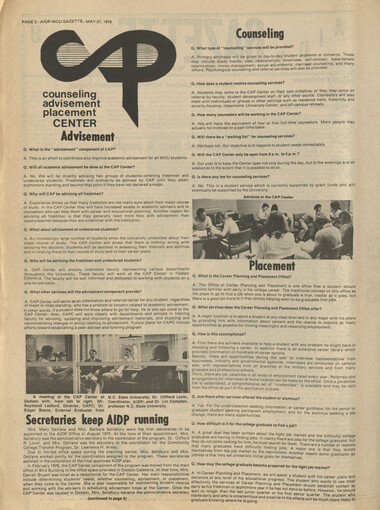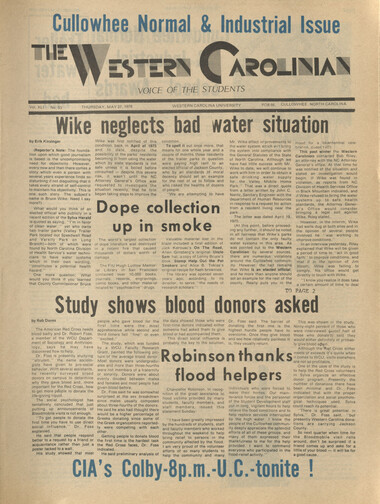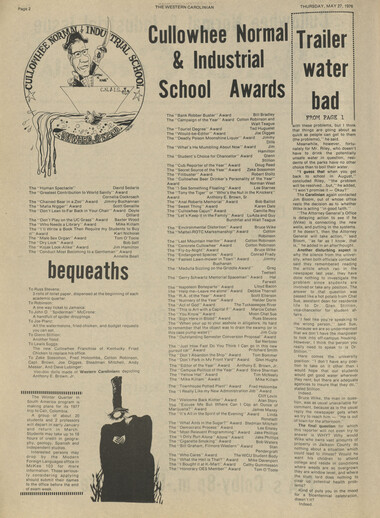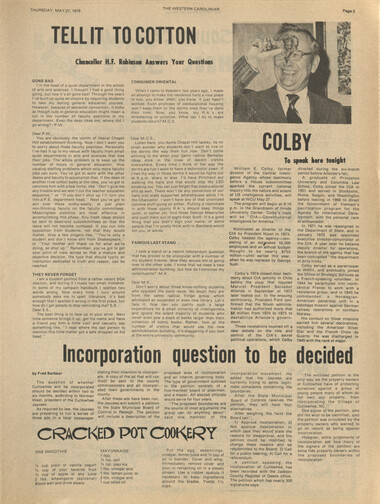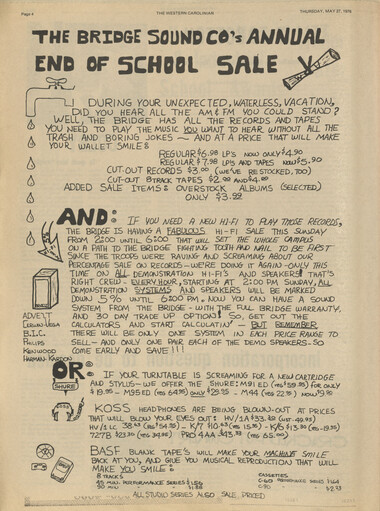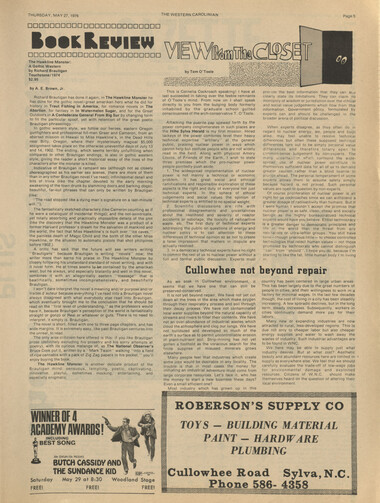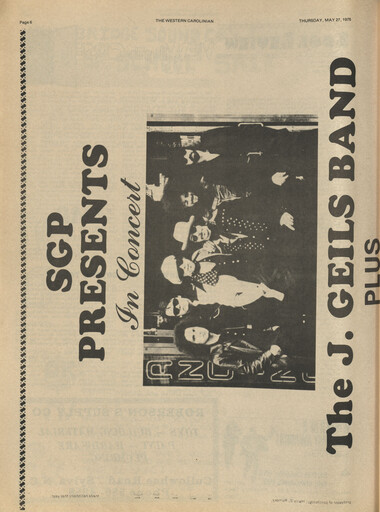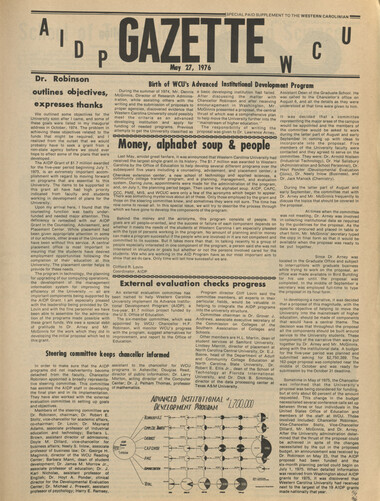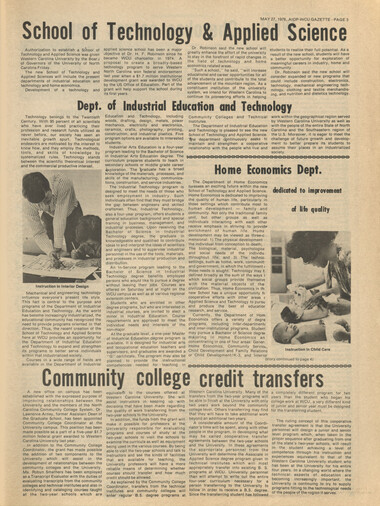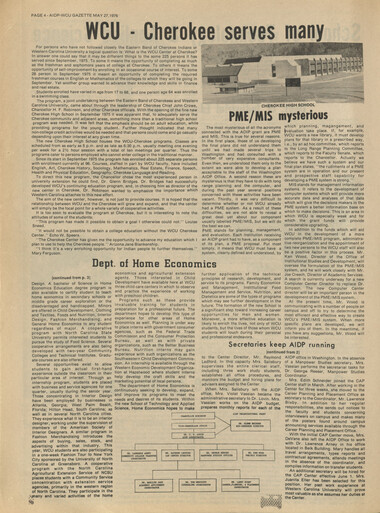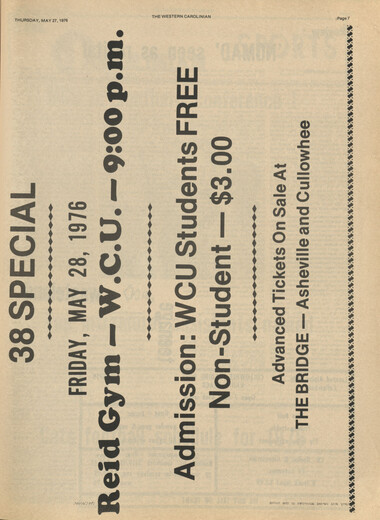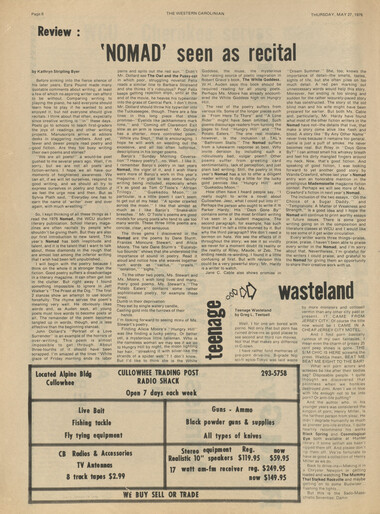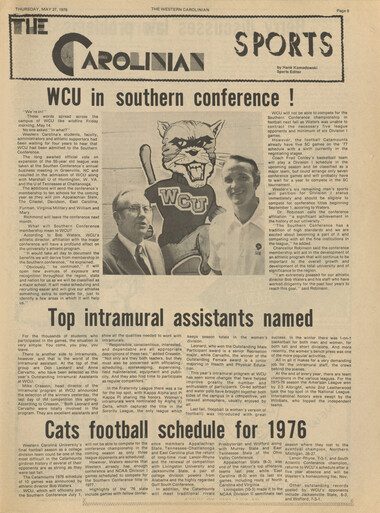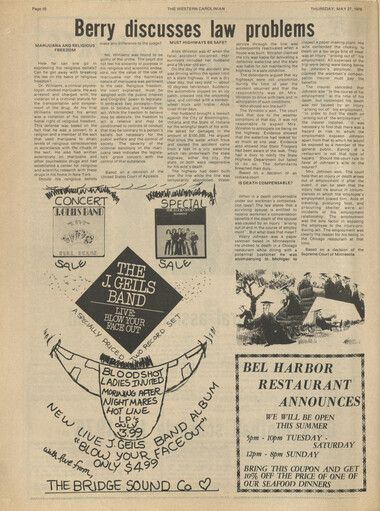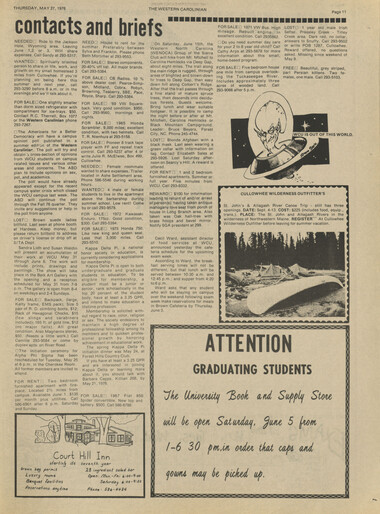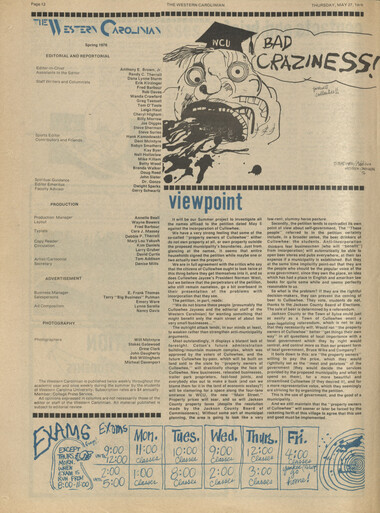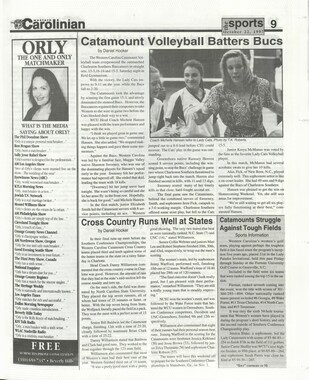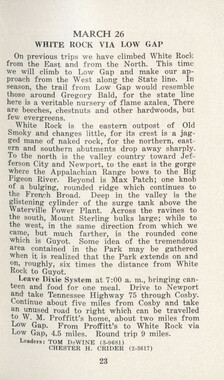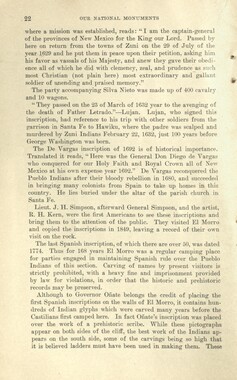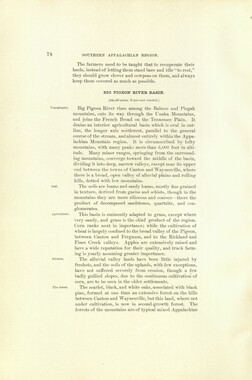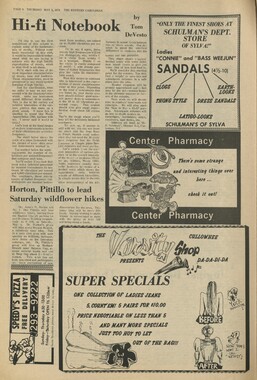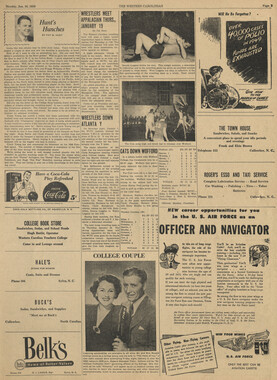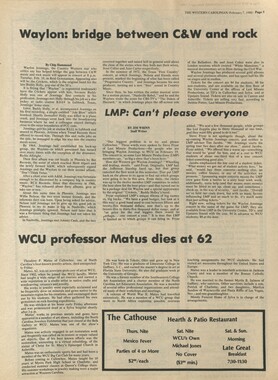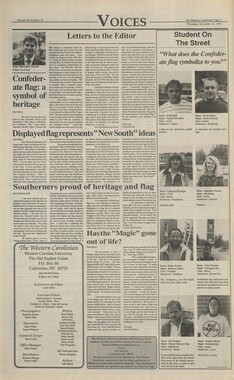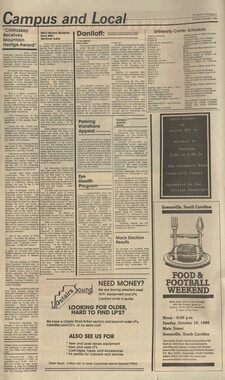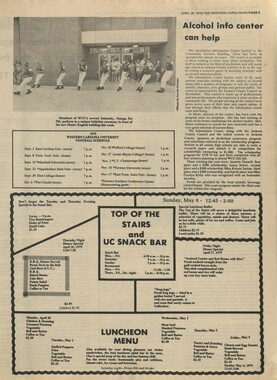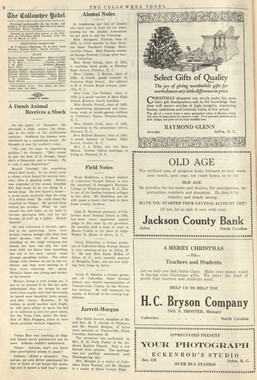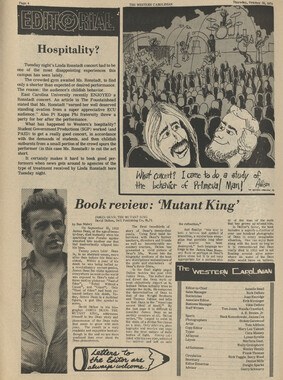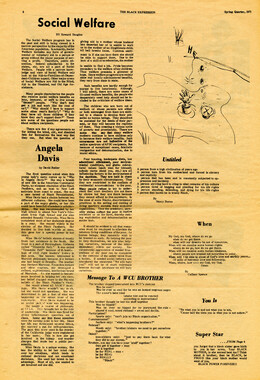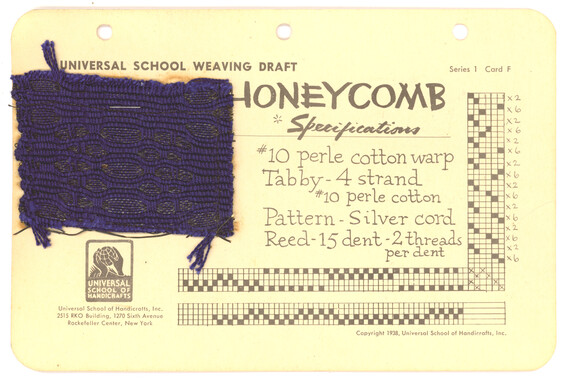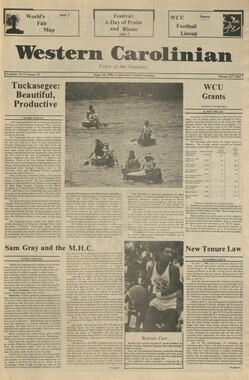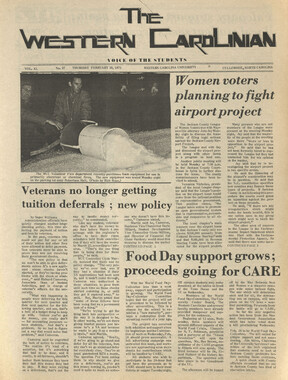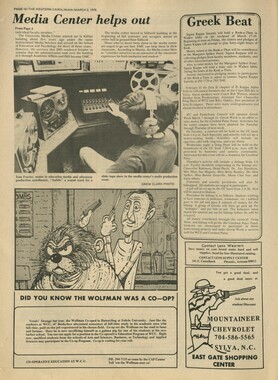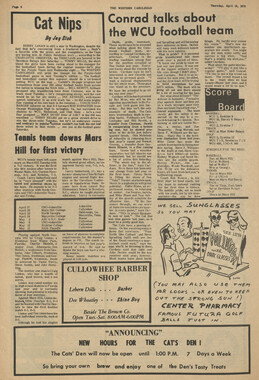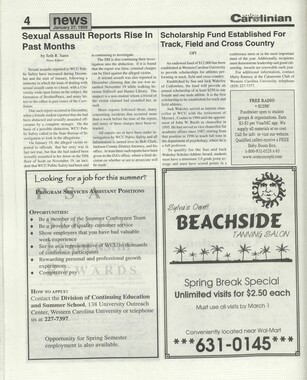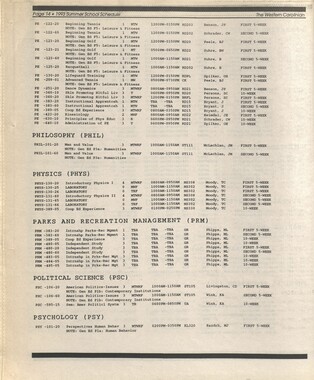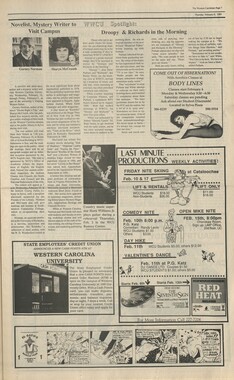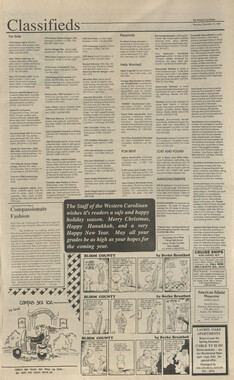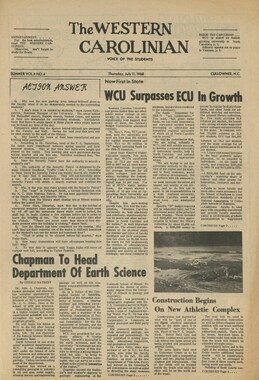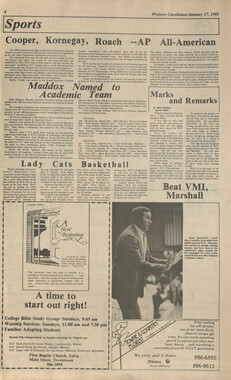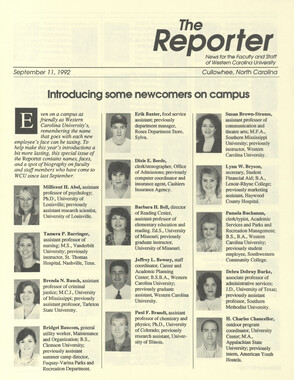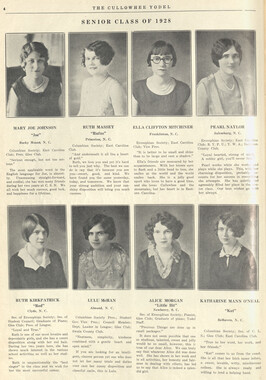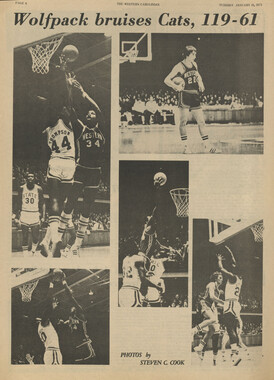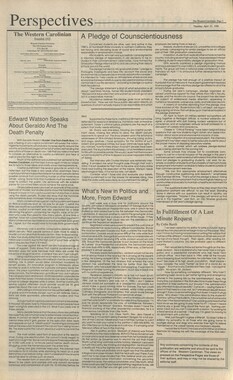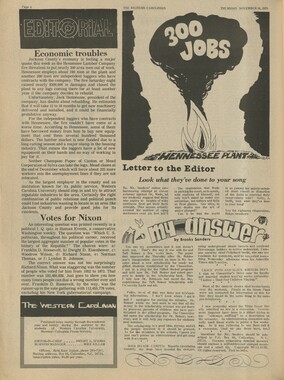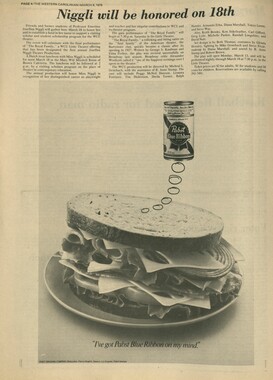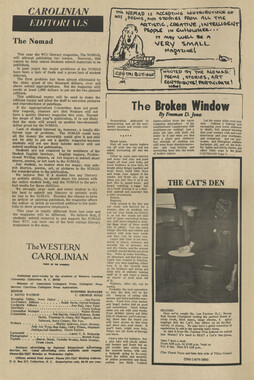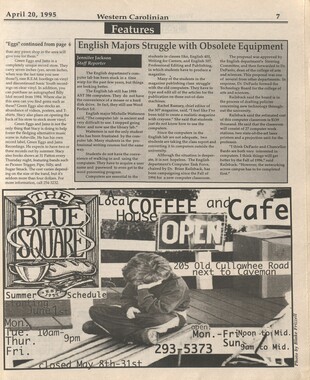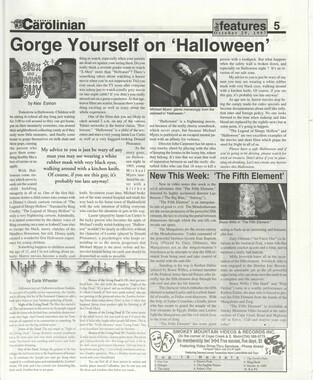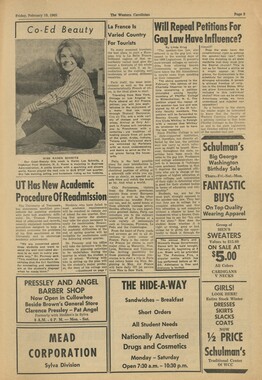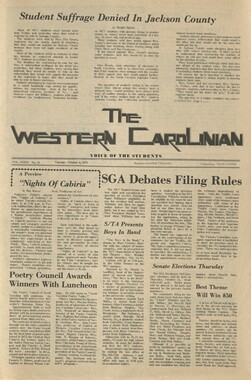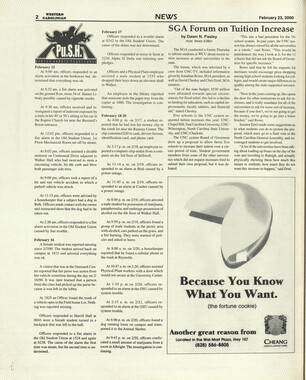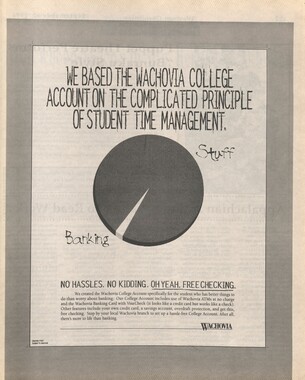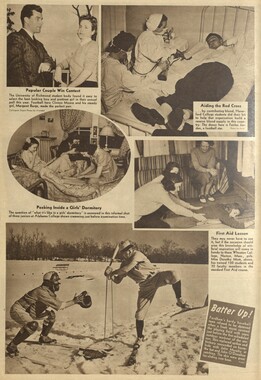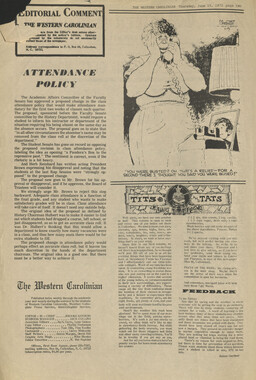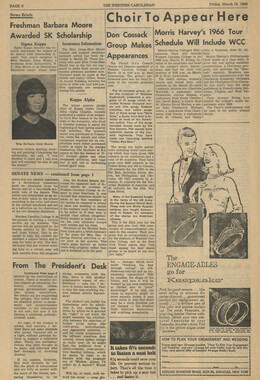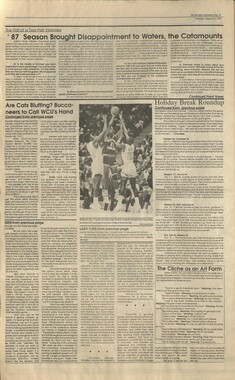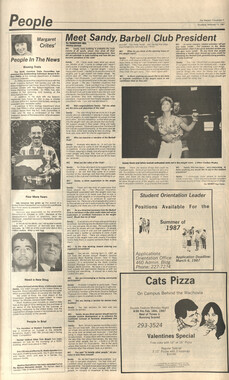Western Carolina University (20)
View all
- Canton Champion Fibre Company (2308)
- Cherokee Traditions (293)
- Civil War in Southern Appalachia (165)
- Craft Revival (1942)
- Great Smoky Mountains - A Park for America (2767)
- Highlights from Western Carolina University (430)
- Horace Kephart (941)
- Journeys Through Jackson (154)
- LGBTQIA+ Archive of Jackson County (26)
- Oral Histories of Western North Carolina (314)
- Picturing Appalachia (6772)
- Stories of Mountain Folk (413)
- Travel Western North Carolina (160)
- Western Carolina University Fine Art Museum Vitreograph Collection (129)
- Western Carolina University Herbarium (92)
- Western Carolina University: Making Memories (708)
- Western Carolina University Publications (2283)
- Western Carolina University Restricted Electronic Theses and Dissertations (146)
- Western North Carolina Regional Maps (71)
- World War II in Southern Appalachia (131)
University of North Carolina Asheville (6)
View all
- Allanstand Cottage Industries (62)
- Appalachian National Park Association (53)
- Bennett, Kelly, 1890-1974 (1388)
- Berry, Walter (76)
- Brasstown Carvers (40)
- Carver, George Washington, 1864?-1943 (26)
- Cathey, Joseph, 1803-1874 (1)
- Champion Fibre Company (233)
- Champion Paper and Fibre Company (297)
- Cherokee Indian Fair Association (16)
- Cherokee Language Program (22)
- Crowe, Amanda (40)
- Edmonston, Thomas Benton, 1842-1907 (7)
- Ensley, A. L. (Abraham Lincoln), 1865-1948 (275)
- Fromer, Irving Rhodes, 1913-1994 (70)
- George Butz (BFS 1907) (46)
- Goodrich, Frances Louisa (120)
- Grant, George Alexander, 1891-1964 (96)
- Heard, Marian Gladys (60)
- Kephart, Calvin, 1883-1969 (15)
- Kephart, Horace, 1862-1931 (313)
- Kephart, Laura, 1862-1954 (39)
- Laney, Gideon Thomas, 1889-1976 (439)
- Masa, George, 1881-1933 (61)
- McElhinney, William Julian, 1896-1953 (44)
- Niggli, Josephina, 1910-1983 (10)
- North Carolina Park Commission (105)
- Osborne, Kezia Stradley (9)
- Owens, Samuel Robert, 1918-1995 (11)
- Penland Weavers and Potters (36)
- Roberts, Vivienne (15)
- Roth, Albert, 1890-1974 (142)
- Schenck, Carl Alwin, 1868-1955 (1)
- Sherrill's Photography Studio (2565)
- Southern Highland Handicraft Guild (127)
- Southern Highlanders, Inc. (71)
- Stalcup, Jesse Bryson (46)
- Stearns, I. K. (213)
- Thompson, James Edward, 1880-1976 (226)
- United States. Indian Arts and Crafts Board (130)
- USFS (683)
- Vance, Zebulon Baird, 1830-1894 (1)
- Weaver, Zebulon, 1872-1948 (58)
- Western Carolina College (230)
- Western Carolina Teachers College (282)
- Western Carolina University (1794)
- Western Carolina University. Mountain Heritage Center (18)
- Whitman, Walt, 1819-1892 (10)
- Wilburn, Hiram Coleman, 1880-1967 (73)
- Williams, Isadora (3)
- Cain, Doreyl Ammons (0)
- Crittenden, Lorraine (0)
- Rhodes, Judy (0)
- Smith, Edward Clark (0)
- Appalachian Region, Southern (2398)
- Asheville (N.C.) (1917)
- Avery County (N.C.) (26)
- Blount County (Tenn.) (161)
- Buncombe County (N.C.) (1671)
- Cherokee County (N.C.) (283)
- Clay County (N.C.) (555)
- Graham County (N.C.) (233)
- Great Smoky Mountains National Park (N.C. and Tenn.) (510)
- Haywood County (N.C.) (3522)
- Henderson County (N.C.) (70)
- Jackson County (N.C.) (4692)
- Knox County (Tenn.) (25)
- Knoxville (Tenn.) (12)
- Lake Santeetlah (N.C.) (10)
- Macon County (N.C.) (420)
- Madison County (N.C.) (211)
- McDowell County (N.C.) (39)
- Mitchell County (N.C.) (132)
- Polk County (N.C.) (35)
- Qualla Boundary (981)
- Rutherford County (N.C.) (76)
- Swain County (N.C.) (2113)
- Transylvania County (N.C.) (247)
- Watauga County (N.C.) (12)
- Waynesville (N.C.) (73)
- Yancey County (N.C.) (72)
- Aerial Photographs (3)
- Aerial Views (60)
- Albums (books) (4)
- Articles (1)
- Artifacts (object Genre) (228)
- Bibliographies (1)
- Biography (general Genre) (2)
- Cards (information Artifacts) (38)
- Clippings (information Artifacts) (191)
- Crafts (art Genres) (622)
- Depictions (visual Works) (21)
- Design Drawings (1)
- Drawings (visual Works) (184)
- Envelopes (73)
- Facsimiles (reproductions) (1)
- Fiction (general Genre) (4)
- Financial Records (12)
- Fliers (printed Matter) (67)
- Glass Plate Negatives (381)
- Guidebooks (2)
- Internegatives (10)
- Interviews (812)
- Land Surveys (102)
- Letters (correspondence) (1013)
- Manuscripts (documents) (619)
- Maps (documents) (177)
- Memorandums (25)
- Minutes (administrative Records) (59)
- Negatives (photographs) (5835)
- Newsletters (1285)
- Newspapers (2)
- Occupation Currency (1)
- Paintings (visual Works) (1)
- Pen And Ink Drawings (1)
- Periodicals (193)
- Personal Narratives (10)
- Photographs (12976)
- Plans (maps) (1)
- Poetry (7)
- Portraits (1960)
- Postcards (329)
- Programs (documents) (151)
- Publications (documents) (2237)
- Questionnaires (65)
- Scrapbooks (282)
- Sheet Music (2)
- Slides (photographs) (402)
- Songs (musical Compositions) (2)
- Sound Recordings (796)
- Specimens (92)
- Speeches (documents) (15)
- Tintypes (photographs) (8)
- Transcripts (322)
- Video Recordings (physical Artifacts) (23)
- Vitreographs (129)
- Text Messages (0)
- A.L. Ensley Collection (275)
- Appalachian Industrial School Records (7)
- Appalachian National Park Association Records (336)
- Axley-Meroney Collection (2)
- Bayard Wootten Photograph Collection (20)
- Bethel Rural Community Organization Collection (7)
- Blumer Collection (5)
- C.W. Slagle Collection (20)
- Canton Area Historical Museum (2110)
- Carlos C. Campbell Collection (282)
- Cataloochee History Project (65)
- Cherokee Studies Collection (4)
- Daisy Dame Photograph Album (5)
- Daniel Boone VI Collection (1)
- Doris Ulmann Photograph Collection (112)
- Elizabeth H. Lasley Collection (1)
- Elizabeth Woolworth Szold Fleharty Collection (4)
- Frank Fry Collection (95)
- George Masa Collection (173)
- Gideon Laney Collection (452)
- Hazel Scarborough Collection (2)
- Hiram C. Wilburn Papers (28)
- Historic Photographs Collection (236)
- Horace Kephart Collection (861)
- Humbard Collection (33)
- Hunter and Weaver Families Collection (1)
- I. D. Blumenthal Collection (4)
- Isadora Williams Collection (4)
- Jesse Bryson Stalcup Collection (47)
- Jim Thompson Collection (224)
- John B. Battle Collection (7)
- John C. Campbell Folk School Records (80)
- John Parris Collection (6)
- Judaculla Rock project (2)
- Kelly Bennett Collection (1407)
- Love Family Papers (11)
- Major Wiley Parris Civil War Letters (3)
- Map Collection (12)
- McFee-Misemer Civil War Letters (34)
- Mountain Heritage Center Collection (4)
- Norburn - Robertson - Thomson Families Collection (44)
- Pauline Hood Collection (7)
- Pre-Guild Collection (2)
- Qualla Arts and Crafts Mutual Collection (12)
- R.A. Romanes Collection (681)
- Rosser H. Taylor Collection (1)
- Samuel Robert Owens Collection (94)
- Sara Madison Collection (144)
- Sherrill Studio Photo Collection (2558)
- Smoky Mountains Hiking Club Collection (616)
- Stories of Mountain Folk - Radio Programs (374)
- The Reporter, Western Carolina University (510)
- Venoy and Elizabeth Reed Collection (16)
- WCU Gender and Sexuality Oral History Project (32)
- WCU Mountain Heritage Center Oral Histories (25)
- WCU Oral History Collection - Mountain People, Mountain Lives (71)
- WCU Students Newspapers Collection (1744)
- Western North Carolina Tomorrow Black Oral History Project (69)
- William Williams Stringfield Collection (2)
- Zebulon Weaver Collection (109)
- African Americans (390)
- Appalachian Trail (35)
- Artisans (521)
- Cherokee art (84)
- Cherokee artists -- North Carolina (10)
- Cherokee language (21)
- Cherokee pottery (101)
- Cherokee women (208)
- Church buildings (167)
- Civilian Conservation Corps (U.S.) (110)
- College student newspapers and periodicals (1830)
- Dams (103)
- Dance (1023)
- Education (222)
- Floods (61)
- Folk music (1015)
- Forced removal, 1813-1903 (2)
- Forest conservation (220)
- Forests and forestry (921)
- Gender nonconformity (4)
- Great Smoky Mountains National Park (N.C. and Tenn.) (181)
- Hunting (38)
- Landscape photography (10)
- Logging (103)
- Maps (84)
- Mines and mineral resources (8)
- North Carolina -- Maps (18)
- Paper industry (38)
- Postcards (255)
- Pottery (135)
- Railroad trains (71)
- Rural electrification -- North Carolina, Western (3)
- School integration -- Southern States (2)
- Segregation -- North Carolina, Western (5)
- Slavery (5)
- Sports (452)
- Storytelling (245)
- Waterfalls -- Great Smoky Mountains (N.C. and Tenn.) (66)
- Weaving -- Appalachian Region, Southern (280)
- Wood-carving -- Appalachian Region, Southern (328)
- World War, 1939-1945 (173)
Western Carolinian Volume 41 Number 53
Item
Item’s are ‘child’ level descriptions to ‘parent’ objects, (e.g. one page of a whole book).
-
-
PAGE 2 - AIDP-WCU GAZETTE, MAY 27, 1976 Counseling Q. What type of " counseling advisement placement CENTER Advisement inseling" services will be provided? A. Primary emphasis will be given to day-to-day student problems or concerns. These may include study habits; peer relationships; loneliness; self-concept; male-female relationships; money management; sexual adjustments; marriage counseling; and many others. Psychological counseling and referral services will also be proviaeu. Q. How does a student receive counseling services? A. Students may come to the CAP Center on their own initiative, or they may come on referral by faculty, student development staff, or any other source. Counselors will also meet with individuals or groups in other settings such as residence halls; fraternity and sorority housing; classrooms; University Center; and off-campus retreats. Q. How many counselors will be working in the CAP Center? A. We.will have the equivalent of four or five full-time counselors. More people may actually be involved on a part-time basis. Q. Will there be a "waiting list" for counseling services? A. We hope not. Our objective is to respond to student needs immediately. Q. Will the CAP Center only be open from 8 a.m. to 5 p.m.? A. Our plan is to keep the Center open not only during the day, but in the evenings and on weekends to the extent that it is possible to do so. Q. What is the "advisement" component of CAP? A. This is an effort to coordinate and improve academic advisement for all WCU students. Q. Will all academic advisement be done at the CAP Center? A. No. We will be directly advising two groups of students-entering freshmen and q. |s there any fee for counseling services? undeclared students. Freshmen will ordinarily be advised by CAP until they attain sophomore standing and beyond that point if they have not declared a major. Q. Why will CAP be advising all freshmen? A. Experience shows us that many freshmen are not really sure about their major course of study. In the CAP Center they will have increased access to academic advisers and to counselors who can help them with career and educational planning. Another reason for advising all freshmen is that they generally need more help with advisement than upperclassmen because they are unfamiliar with the institution. Q. What about advisement of undeclared students? A. An increasingly large number of students enter the University undecided about their major course of study. The CAP Center will stress that there is nothing wrong with delaying the decision. Students will be assisted in assessing their interests and abilities and in relating these to their course of study and to their career plans. Q. Who will be advising the freshmen and undeclared students? A. CAP Center will employ interested faculty representing various departments throughout the University. These facultv will work at the CAP Center in nodson Cafeteria. The faculty will be well informed and dedicated to working with students on a one-to-one basis. Q. What other services will the advisement component provide? A. CAP Center will serve as an information and referral center for any student, regardless ot major or class standing, who has a problem or concern related to academic advisement. In other words, if a student does not know where to go for help, he or she can come to the CAP Center. Also, CAPC will work closely with departments and schools in training faculty for advising, updating and improving advisement materials, and studying and recommending changes in policy relating to advisement. Future plans for CAPC include efforts toward establishing a peer-adviser and tutoring program. supported by grant funds and v ♦." i ^lt Placement Q. What is the Career Planning and Placement Office? A. The Office of Career Planning and Placement is one office that a student should become familiar with early in his college career. The traditional concept of this office as the place to go to find a job when one is about to graduate is true, insofar as it goes, but there is a good bit more to it than simply helping soon-to-be graduates find jobs. Q. What services does the Career Planning and Placement Office offer? A. A major function is to assist a student at any class level and in any major with his plans by providing him with information about careers and the chance to explore as many opportunities as possible for finding meaningful and rewarding employment. O. How is this accomplished? A. First there are advisers available to help a student v, choosing and following a career. In addition there is i provides information on hundreds of career options 8re °lZn«"!!i?LiUl"9„ ,he -year ,0 interview representees from Interviews are conducted on campus itary services and from many th any problem he might have in n extensive career library which businesses, industry and governmental agencie also, with representatives from all branches of the r graduate and professional schools, ird, there are job vacancies ir arrangements for interviews a, homelStSn^e m'ie tUZZ?^' ^^ "2 file is established, a comprehensive set of "credent" I L, °"ce a Pe^sonne from the office as par. of the application process ' a"ab'e *"" ™" '" ^ A meeting In the CAP Center at N.C. State University; Dr. Clifford Lovin, Dodson with, from left to right, Mr. Coordinator, AIDP; and Dr. Lin Compton, Raymond Ledford, Director, CAPC; Dr. professor N.C. State University. Edgar Boone, External Evaluator from Secretaries keep AIDP running Mrs. Mary DeVane and Mrs. Barbara Salisbury were the first secretaries to be appointed to the AIDP Office in August 1975. At the time of their appointment, Mrs. Salisbury was the administrative secretary to the coordinator of the program, Dr. Clifford R. Lovin, and Mrs. DeVane was the secretary to the coordinator for the Community College Transfer Program, Dr. Lawrence H. Arney. Due to limited office space during the planning period, Mrs. Salisbury and Mrs. DeVane worked jointly for the coordinators assigned to the program. These secretaries assisted in the completion of the final approved AIDP plan. In February 1976, the CAP Center component of the program was moved from the office in Bird Building to the office space provided in Dodson Cafeteria. At that time, Darrell Bryant was hired as a receptionist for the CAP Center. Her main responsibilities include determining students' needs, whether counseling, advisement, or placemenl when they come to the Center. She is also responsible for maintaining student records and working with the advisers in scheduling advisement times at the Center. Once the CAP Center was located in Dodson, Mrs. Salisbury became the administrative secretary [continued to page 4] Q. Are there other services offered the student or alumnus? A. Yes. For the underclassmen seeking information nr ,.=.-«„ graduate student seeking permanent^! ymenV TZ ".£"HS* for thf.senior °! change, there are many opportunities. e alumnus seekin9 a lob Q. How difficult is it for the college graduate to find a job? A. A great deal has been written about the tinht i„k ~ , . graduates are having in finding jobs In rell itv here LP k^ T the diffiCU"y C°"ege they do no. come looking for him; he must sear J oAZl th^ ^ C°"ege 9raduat6' bU' that many graduates have difficulty , ndmq job A m ^ ^ * nUmber °f r6aS°nS themselves from the job market by the restrictions LZ^ °n6 'S that they iS°'ate ;„u...:......, . .. .. ' le ,eslrlc,l0ns- Another reason snmo nr=.H,,Qtoc nn jobless is that they set unrealistic ir 3l goals for themselves. 9 graduates go Q. How may the college graduate become prepared for the tight job market? A. In Career Planning and Placement, we will assist a •?.«<*•« ,.k decisions at any level of his educational pTogress Th Si T^ Career P'3nS "I effectively the services of Career Planninc and Pi»« . u ° Wan,S t0 USe m°S early as his freshman or sophomore yea he has nofrfn ?°.M 6S,abliSh C°n,aCt *S wait no longer than the last junior quarter oh sTir.t "f S° M°Te- H°Wever' he Sh°U'd starts early and who is conscientious and creative in hfc .TT qUarter The student wh° graduate knowing where he is going 'S efforts wi" be much more likely to
Object
Object’s are ‘parent’ level descriptions to ‘children’ items, (e.g. a book with pages).
-
The Western Carolinian is Western Carolina University's student-run newspaper. The paper was published as the Cullowhee Yodel from 1924 to 1931 before changing its name to The Western Carolinian in 1933.
-
